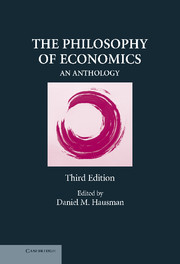Book contents
- Frontmatter
- Contents
- Introduction
- PART ONE CLASSIC DISCUSSIONS
- PART TWO POSITIVIST AND POPPERIAN VIEWS
- PART THREE IDEOLOGY AND NORMATIVE ECONOMICS
- 11 Science and Ideology
- 12 Welfare Propositions of Economics and Interpersonal Comparisons of Utility
- 13 The Philosophical Foundations of Mainstream Normative Economics
- 14 Why Is Cost-Benefit Analysis So Controversial?
- 15 Capability and Well-Being
- PART FOUR BRANCHES AND SCHOOLS OF ECONOMICS AND THEIR METHODOLOGICAL PROBLEMS
- PART FIVE NEW DIRECTIONS IN ECONOMIC METHODOLOGY
- Selected Bibliography of Books on Economic Methodology
- Index
- References
13 - The Philosophical Foundations of Mainstream Normative Economics
Published online by Cambridge University Press: 05 June 2012
- Frontmatter
- Contents
- Introduction
- PART ONE CLASSIC DISCUSSIONS
- PART TWO POSITIVIST AND POPPERIAN VIEWS
- PART THREE IDEOLOGY AND NORMATIVE ECONOMICS
- 11 Science and Ideology
- 12 Welfare Propositions of Economics and Interpersonal Comparisons of Utility
- 13 The Philosophical Foundations of Mainstream Normative Economics
- 14 Why Is Cost-Benefit Analysis So Controversial?
- 15 Capability and Well-Being
- PART FOUR BRANCHES AND SCHOOLS OF ECONOMICS AND THEIR METHODOLOGICAL PROBLEMS
- PART FIVE NEW DIRECTIONS IN ECONOMIC METHODOLOGY
- Selected Bibliography of Books on Economic Methodology
- Index
- References
Summary
Michael S. McPherson (1947–) received his Ph.D. from the University of Chicago and taught for many years at Williams College before becoming President of Macalester College and then of the Spencer Foundation. His academic work concerns the economics of higher education and issues at the boundaries of economics and ethics. He and Daniel Hausman founded the journal Economics and Philosophy in 1985 and edited it for its first ten years. They also coauthored Economic Analysis, Moral Philosophy, and Public Policy, from which this essay derives.
Let us begin with an old joke. Brezhnev and other members of the Soviet Central Committee are reviewing a May Day parade in Moscow. Thousands of infantry march by, followed by armored cars, the latest tanks, long range artillery, and progressively larger, sleeker, and more impressive missiles. At the end, a battered flatbed truck rumbles by carrying a half-dozen unathletic and bespectacled middle-aged men and women in dirty raincoats sitting around a card table. The crowd is restless and members of the Central Committee are scandalized. One is bold enough to ask Brezhnev what these nondescript civilians are doing in the midst such a magnificent military parade. Brezhnev replies, “Ah, those are our economists. You'd be amazed at the damage they can do.”
Like most economist jokes, this one is unkind, but its unkindness should not be exaggerated. It refers to the damage economists can do, not to any inevitable harm that they cause. And there is no suggestion that their intentions are evil.
- Type
- Chapter
- Information
- The Philosophy of EconomicsAn Anthology, pp. 226 - 250Publisher: Cambridge University PressPrint publication year: 2007
References
- 6
- Cited by



